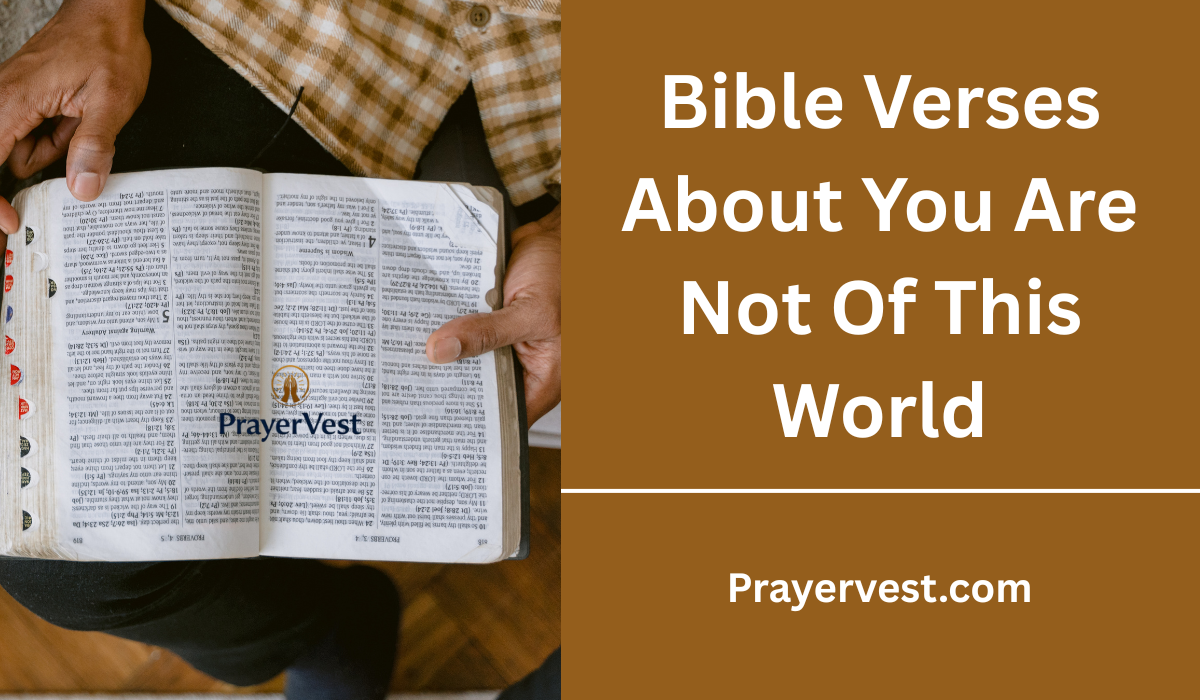Believers are often reminded in the Bible that they are unique and called to live in a way that differs from the world. Adopting a higher identity based in Christ rather than the transient ideals and structures of society is what it means to be “not of this world.”
Scripture reminds us that although we are here on earth, our ultimate loyalty belongs to God, and our actual citizenship is in heaven. This viewpoint shapes our thoughts, behaviors, and interactions with others, while helping us cultivate an enduring attitude.
God’s people are described as pilgrims, outsiders, and aliens on earth—passing through but not entirely belonging here—in both the Old and New Testaments. Jesus Himself reinforced this point when He told His followers that they were selected from the world and would serve as a reflection of a kingdom that was not founded on material wealth or human arrogance.
This lesson was repeated by the apostles, who exhorted Christians to reject worldly norms and allow their minds to be renewed, so that they might be transformed. Despite a culture that frequently rejects them, these texts serve as a reminder that our lives are supposed to represent God’s holiness, truth, and love.


Examining Bible passages that discuss being “not of this world” can provide consolation to people who feel alienated or misunderstood in their religious beliefs. It gives us comfort in knowing that distancing oneself from worldly ideals does not mean loneliness but rather conformity with God’s everlasting plan. Knowing that Christ is our home, our heritage, and our reward, these verses exhort us to live with bravery, integrity, and hope. By clinging to these principles, we can walk with assurance, illuminating a dark world while maintaining our focus on the everlasting kingdom that lies ahead.
40 Inspiring Bible Verses About You Are Not Of This World (current_date format=”Y”])
1. John 15:19
“If you were of the world, the world would love its own. Yet because you are not of the world, but I chose you out of the world, therefore the world hates you.”
Here, Jesus explains the tension believers face as they live in a fallen world while belonging to Him. To be “not of this world” means being set apart—our values, priorities, and allegiance are no longer defined by worldly standards but by the kingdom of God. This verse highlights both the cost and the privilege of discipleship: the world may reject us, but we are chosen by Christ Himself.
2. Romans 12:2
“Do not be conformed to this world, but be transformed by the renewing of your mind, that you may prove what is that good and acceptable and perfect will of God.”
Paul exhorts believers not to adopt the patterns and values of this world but to be transformed inwardly through God’s Word and Spirit. To be “not of this world” requires a renewed mind that discerns God’s will above cultural pressures. This verse emphasizes intentional separation from worldly thinking and alignment with God’s higher purposes.
3. Philippians 3:20
“But our citizenship is in heaven. And we eagerly await a Savior from there, the Lord Jesus Christ.”
Paul reminds believers that their true identity and belonging are not earthly but heavenly. While we live here temporarily, our ultimate citizenship is in God’s kingdom. This perspective transforms how we live—shaping our hopes, priorities, and expectations. To be “not of this world” is to live as ambassadors of heaven, awaiting Christ’s return with hope.
4. 1 Peter 2:11
“Beloved, I urge you as sojourners and exiles to abstain from the passions of the flesh, which wage war against your soul.”
Peter describes believers as “sojourners and exiles,” reminding us that earth is not our final home. To be “not of this world” is to resist sinful desires and live as temporary residents passing through. This imagery underscores the call to holiness and vigilance, knowing that our true inheritance is eternal and far greater than anything this world offers.
5. John 17:14
“I have given them your word, and the world has hated them because they are not of the world, just as I am not of the world.”
In His prayer to the Father, Jesus acknowledges that His followers will face opposition because of their allegiance to God’s truth. Being “not of this world” sets believers apart, and this separation often results in misunderstanding and hostility from others. Yet, this verse also affirms the believer’s deep connection to Christ, who Himself was rejected by the world.
6. Colossians 3:2
“Set your minds on things above, not on things that are on earth.”
Paul instructs Christians to lift their focus beyond earthly distractions and fix their hearts on eternal realities. Being “not of this world” requires an intentional mindset—choosing to prioritize heaven’s values over temporal gains. This verse is a practical call to live with eternal perspective, shaping our choices, desires, and ambitions.
7. James 4:4
“Do you not know that friendship with the world is enmity with God? Therefore, whoever wishes to be a friend of the world makes himself an enemy of God.”
James warns against aligning too closely with worldly systems and desires. To be “not of this world” means living in loyalty to God, even if it places us in conflict with worldly norms. This verse highlights the incompatibility of loving God while clinging to the world’s values—it calls for undivided devotion.
8. Galatians 6:14
“But far be it from me to boast except in the cross of our Lord Jesus Christ, by which the world has been crucified to me, and I to the world.”
Paul testifies that the cross of Christ radically redefined his relationship with the world. To be “not of this world” is to recognize that the world’s approval and achievements pale in comparison to the glory of the cross. This verse challenges us to let go of worldly pride and embrace the humility of Christ-centered living.
9. 1 John 2:15
“Do not love the world or the things in the world. If anyone loves the world, the love of the Father is not in him.”
John draws a sharp line between love for the world and love for God. To be “not of this world” means refusing to be captivated by materialism, lust, or pride. Instead, believers are called to cultivate deep love for God, which ultimately satisfies far more than the fleeting pleasures of worldly pursuits.
10. Hebrews 13:14
“For here we have no lasting city, but we seek the city that is to come.”
The writer of Hebrews reminds us that earthly life is temporary, and all human structures eventually fade. Believers are called to place their hope in the eternal city that God has prepared. This verse reinforces the pilgrim mindset—living faithfully now while anticipating the heavenly home that awaits us.
11. John 18:36
“Jesus answered, ‘My kingdom is not of this world. If my kingdom were of this world, my servants would have been fighting, that I might not be delivered over to the Jews. But my kingdom is not from the world.’”
Here, Jesus makes it clear to Pilate that His kingdom is unlike earthly kingdoms that depend on violence, armies, or political structures. His reign is spiritual and eternal, operating on principles of truth, justice, and righteousness rather than force. This distinction helps believers understand that their allegiance belongs first to Christ’s eternal kingdom, not to the temporary systems of the world.
12. Matthew 6:19-20
“Do not lay up for yourselves treasures on earth, where moth and rust destroy and where thieves break in and steal, but lay up for yourselves treasures in heaven, where neither moth nor rust destroys and where thieves do not break in and steal.”
Jesus warns against the pursuit of material wealth as the foundation of life. Earthly possessions are temporary and vulnerable to loss, but heavenly treasures are eternal and secure. By focusing on eternal values—faith, obedience, love, and service—believers live out their calling as those “not of this world,” building a legacy that endures beyond earthly existence.
13. 1 Corinthians 2:12
“Now we have received not the spirit of the world, but the Spirit who is from God, that we might understand the things freely given us by God.”
Paul emphasizes the unique gift believers receive through the Holy Spirit. Unlike worldly wisdom, which depends on human reasoning and cultural norms, the Spirit reveals divine truth and opens our eyes to God’s promises. This sets Christians apart from the world, as their understanding and guidance flow not from temporary human systems but from God Himself.
14. 2 Corinthians 4:18
“So we fix our eyes not on what is seen, but on what is unseen, since what is seen is temporary, but what is unseen is eternal.”
The apostle Paul urges believers to adopt an eternal perspective. While visible circumstances—pain, struggles, and material possessions—may seem overwhelming, they are all temporary. What truly matters is the unseen reality of God’s promises, which endure forever. This call to focus on eternity reflects the identity of those who are “not of this world,” living by faith and hope rather than sight.
15. 1 John 5:19
“We know that we are from God, and the whole world lies in the power of the evil one.”
This verse highlights the spiritual conflict that defines life in this present world. While the systems of the world are influenced by evil, believers belong to God and are under His protection. To be “not of this world” is to recognize this difference and live in the assurance of God’s authority, even in the midst of spiritual opposition.
16. John 12:25
“Whoever loves his life loses it, and whoever hates his life in this world will keep it for eternal life.”
Jesus teaches that clinging too tightly to worldly pleasures, ambitions, and security ultimately leads to loss. In contrast, surrendering worldly priorities for the sake of Christ leads to eternal gain. This paradox shows that being “not of this world” means valuing eternal life with God above the fleeting attractions of earthly living.
17. Titus 2:12
“It teaches us to say ‘No’ to ungodliness and worldly passions, and to live self-controlled, upright and godly lives in this present age.”
Paul explains that God’s grace not only saves but also transforms believers. It empowers them to reject worldly desires and live in holiness, reflecting God’s character in a corrupt world. This separation from worldly passions marks the believer’s distinct identity as one who is not shaped by cultural trends but by divine truth.
18. 1 Corinthians 7:31
“Those who use the things of the world, as if not engrossed in them. For this world in its present form is passing away.”
Paul encourages believers to engage with the world wisely, using its resources without becoming consumed by them. Since the world is temporary, Christians are called to live with balance, not attaching themselves too deeply to things that will not last. This perspective reflects a life set apart, focused on eternal rather than temporary realities.
19. 1 John 3:1
“See what kind of love the Father has given to us, that we should be called children of God; and so we are. The reason why the world does not know us is that it did not know him.”
John celebrates the great love of God that makes believers His children. This identity sets Christians apart from the world, which does not recognize or understand them because it does not know God. Being “not of this world” is rooted in belonging to God’s family, which gives believers both privilege and responsibility in their walk of faith.
20. Ephesians 2:19
“So then you are no longer strangers and aliens, but you are fellow citizens with the saints and members of the household of God.”
Paul reassures believers that while they may feel like outsiders in the world, they have full citizenship in God’s kingdom. They are not isolated wanderers but members of a divine household, united with other believers in Christ. This identity replaces the temporary belonging of the world with the eternal security of God’s family.
21. Colossians 1:13
“He has delivered us from the domain of darkness and transferred us to the kingdom of his beloved Son.”
Paul emphasizes the radical transformation that occurs when someone comes to Christ. Believers are no longer under the control of darkness or worldly systems but have been transferred into Christ’s kingdom. This shift marks a new identity—one that is not of this world but rooted in God’s eternal rule.
22. 2 Timothy 4:18
“The Lord will rescue me from every evil deed and bring me safely into his heavenly kingdom. To him be the glory forever and ever. Amen.”
Paul speaks with confidence that God will guard him against evil and ultimately bring him safely into His eternal kingdom. This verse highlights the believer’s destiny, reminding us that our true home and security are found not in the world but in God’s everlasting kingdom.
23. 1 Thessalonians 5:6
“So then let us not sleep, as others do, but let us keep awake and be sober.”
Paul urges believers to remain spiritually alert and disciplined, in contrast to the complacency of the world. Being “not of this world” means living with vigilance and clarity, aware of the spiritual realities that surround us and the return of Christ.
24. 2 Peter 3:13
“But according to his promise we are waiting for new heavens and a new earth in which righteousness dwells.”
Peter reminds believers that their hope lies not in this present world but in the new creation God has promised. This future perspective gives strength to endure trials and live with righteousness while waiting for the eternal kingdom to come.
25. John 8:23
“He said to them, ‘You are from below; I am from above. You are of this world; I am not of this world.’”
Jesus draws a sharp distinction between Himself and the people questioning Him. He belongs to heaven, while they remain bound to the world. Believers share in this same separation through Christ, no longer defined by worldly systems but by heavenly identity.
26. Revelation 21:1
“Then I saw a new heaven and a new earth, for the first heaven and the first earth had passed away, and the sea was no more.”
John describes the ultimate fulfillment of God’s plan: the creation of a new heaven and earth. This vision emphasizes that the current world is temporary, and believers are destined for an eternal, perfect dwelling place with God.
27. Psalm 119:19
“I am a sojourner on the earth; hide not your commandments from me!”
The psalmist recognizes his temporary status in the world and seeks God’s Word as his guide. This verse highlights the pilgrim nature of the believer’s life—journeying through this world but relying on God’s eternal truth for direction.
28. Luke 12:15
“And he said to them, ‘Take care, and be on your guard against all covetousness, for one’s life does not consist in the abundance of his possessions.’”
Jesus warns against greed, reminding His followers that life is not measured by material wealth. This teaching points believers toward eternal values rather than worldly possessions, showing that true life is found in God, not in the things of this world.
29. Philippians 1:21
“For to me to live is Christ, and to die is gain.”
Paul expresses his wholehearted devotion to Christ, recognizing that earthly life is an opportunity to serve God, while death brings the ultimate gain of eternal life. This perspective reflects the believer’s identity as one who is not bound by this world but lives for eternity.
30. Hebrews 11:13
“These all died in faith, not having received the things promised, but having seen them and greeted them from afar, and having acknowledged that they were strangers and exiles on the earth.”
The writer of Hebrews honors the heroes of faith who lived with the awareness that they were temporary residents on earth. Their lives exemplify what it means to be “not of this world”—living with faith in God’s promises even without seeing their full fulfillment in this lifetime.
31. Philippians 3:20
“But our citizenship is in heaven. And we eagerly await a Savior from there, the Lord Jesus Christ.”
Paul reminds believers that their true home is not on earth but in heaven. This verse underscores the Christian identity as citizens of God’s eternal kingdom. Though we live in the world, our allegiance, hope, and future are secured in Christ. It helps us keep an eternal mindset, prioritizing heavenly values over earthly ones.
32. Hebrews 11:13
“All these people were still living by faith when they died. They did not receive the things promised; they only saw them and welcomed them from a distance, admitting that they were foreigners and strangers on earth.”
The heroes of faith described in Hebrews lived with a vision beyond this world. They considered themselves strangers here because their hearts were fixed on God’s promises. This perspective reminds believers that faith means looking forward to eternal fulfillment, even when it is not realized in earthly life.
33. Hebrews 13:14
“For here we do not have an enduring city, but we are looking for the city that is to come.”
This verse emphasizes the temporary nature of earthly life and possessions. The Christian’s focus should remain on the eternal city prepared by God, the new Jerusalem. It calls us to live with a pilgrim mindset, not clinging too tightly to the material or fleeting aspects of life.
34. James 4:4
“You adulterous people, don’t you know that friendship with the world means enmity against God? Therefore, anyone who chooses to be a friend of the world becomes an enemy of God.”
James warns against compromise with worldly values. This strong statement highlights the incompatibility between loving God and adopting the sinful patterns of the world. Believers are reminded that devotion to God requires separation from the corrupt systems that oppose His truth.
35. 1 Peter 1:17
“Since you call on a Father who judges each person’s work impartially, live out your time as foreigners here in reverent fear.”
Peter exhorts believers to live with holy reverence, remembering that their time on earth is temporary. As foreigners and exiles, Christians are called to conduct themselves with integrity, knowing they will one day give account before God. This mindset keeps life purposeful and aligned with eternity.
36. 1 Peter 2:11
“Dear friends, I urge you, as foreigners and exiles, to abstain from sinful desires, which wage war against your soul.”
Peter further develops the idea of Christians being strangers in the world. He emphasizes resisting sinful desires, recognizing that earthly temptations are constant threats to spiritual growth. This verse teaches discipline and vigilance, reminding believers to guard their souls.
37. 1 Peter 4:4
“They are surprised that you do not join them in their reckless, wild living, and they heap abuse on you.”
Here, Peter acknowledges the tension between believers and the world. When Christians refuse to conform to sinful lifestyles, they may face criticism, ridicule, or rejection. Yet, this is part of the cost of living as people set apart for God’s kingdom, not the world’s approval.
38. 1 John 2:15
“Do not love the world or anything in the world. If anyone loves the world, love for the Father is not in them.”
John issues a clear command: love for God and love for the world cannot coexist. The affections of believers should be directed toward God, not worldly pleasures or possessions. This verse challenges us to continually examine where our loyalties and desires truly lie.
39. 1 John 4:5
“They are from the world and therefore speak from the viewpoint of the world, and the world listens to them.”
John contrasts worldly teachers with those of God. The world embraces its own because they share the same values, but true followers of Christ speak God’s truth, which may not always be accepted. This verse reminds believers that rejection by the world can affirm their alignment with God.
40. 1 John 5:19
“We know that we are children of God, and that the whole world is under the control of the evil one.”
John closes with a sobering reality: the world lies under the influence of Satan, but believers are set apart as children of God. This truth strengthens faith, reminding Christians that they belong to God’s family and must resist the enemy’s deceptive control.
Conclusion
The Bible serves as a reminder to believers that we are expected to live differently, walking in the light of God’s truth rather than following the trends of this world. These passages highlight that even though we live on earth, we are led by higher ideals that are based in Christ, and that our actual citizenship is in heaven. Living with purpose, holiness, and integrity in a world that frequently contradicts God’s ways is what it means to be “not of this world,” not to be alone. It is an exhortation to hold fast to one’s faith, withstand temptation from the outside world, and radiate truth and hope.
Scripture ultimately gives us comfort in knowing that even if the world rejects us, God has chosen us to be His own. He, not the transient structures of this world, is the source of our identity, safety, and ultimate destiny. We are reminded of the everlasting inheritance that awaits us, inspired to act fearlessly for Christ, and strengthened to withstand hardships by reflecting on these potent verses. Deciding to live as though we are not of this world is a blessing and a hardship, but it is the route that leads to eternal life with God.






